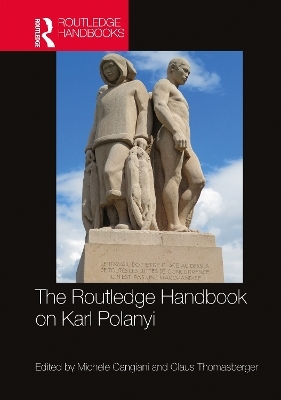
The Routledge Handbook on Karl Polanyi
Routledge (Verlag)
978-1-032-37383-6 (ISBN)
Karl Polanyi is one of the most influential social scientists of our era. A report of the United Nations Conference on Trade and Development (UNCTAD) begins by noting that we are in a "Polanyi era": a time of dangerously unregulated markets, where the greatest need for decisive political action is matched by the least trust in politics.
This handbook provides a comprehensive of recent research on Polanyi’s work and ideas, including the central place occupied by his thinking on the relationship between economics and politics. The stellar line-up of contributors to this book explore Polanyi’s work reflecting the intrinsic interdisciplinarity of Polanyi’s approach to understanding our society, its place in history, its fundamental dynamics, and its contradictions, as well as the methodological issues he raises.
The handbook broadly follows a chronological structure beginning with influences on Polanyi, his formative experiences and early works. A significant section is dedicated to Polanyi’s seminal work, The Great Transformation, and its impact. Further sections also look at Polanyi’s wider influence, on various disciplines and methodological debates, and his ongoing relevance for present-day issues including debates on populism, neoliberalism and low carbon transitions.
This handbook is a vital resource for students and scholars of economics, politics, sociology, and other social sciences.
Michele Cangiani, Università Ca’ Foscari, Venezia, Italy Claus Thomasberger, University of Applied Sciences, Berlin, Germany
Part 1: Polanyi’s early training 1. Károly Polányi’s Hungary János Gyurgyák 2. On the edge of Austro-Marxism Diego De Bernardin Stadoan 3. The socialist calculation debate and the problem of modern civilization Claus Thomasberger Part 2: The ‘Great Transformation’ I . In theory 4. Polanyi and neoliberalism Bob Jessop 5. Twenty-first-century capitalism between embeddedness and disembeddedness: Karl Polanyi and beyond Cristiano Fonseca Monteiro and Raphael Jonathas da Costa Lima 6. Antimonies of the ‘double movement’: From Polanyi to the Polanyi debate Eren Duzgun 7. Markets, Protectionism and Self-Regulation: A key to the ‘Great Transformation’ Hannes Lacher II . Its history 8. The League of Nations’ program ‘Financial Reconstruction of Austria’ and Polanyi’s economic and political theory Maria Markantonatou 9. The World Economic Crisis of the 1930s. Polanyi’s analysis of the Great Depression, and the current global crisis Kari Polanyi Levitt 10. Observing the transformation. Polanyi’s writings in the interwar period Michele Cangiani 11. Polanyi’s unorthodox contribution to the study of fascism Kris Millett and Sang Hun Lim 12. Karl Polanyi and the ‘international civil war’: The analysis of a lucid witness and interpreter of his time Francesco Soverina 13. Karl Polanyi’s idea of co-existence: War and peace in the international frames of politics and economy in the interwar period Chikako Nakayama 14. After World War II: Universal capitalism or regional planning? Claus Thomasberger Part 3: Historical and anthropological studies 15. Polanyi’s anthropological insights: a comparative-holistic approach Justin A. Elardo 16. Karl Polanyi and the study of the Ancient Mediterranean and Western Asia David Tandy 17. Karl Polanyi on money Jérôme Maucourant Part 4: Methodology and political philosophy 18. Freedom and socialism Michael Brie 19. Polanyi versus Hayek. The problem of freedom and democracy in the market society Paula Valderrama 20. Marx and Polanyi: A philosophical encounter Hüseyin Özel 21. Polanyi reads Marx Michele Cangiani 22. Polanyi’s institutionalism between the lines Sabine Frerichs 23. Karl Polanyi’s institutionalist approach and its contemporary value for the social sciences Giorgio Resta 24. How theories shape, and are shaped by history Chaitawat Boonjubun and Asad Zaman 25. Making interdependence Übersichtlich: Reading Polanyi through a (neo)republican Lens Louis Mosar Part 5: Current problems and debates 26. Where Polanyi is more relevant than ever: Social justice and technical productivity in scientific knowledge production Emrah Irzik and Gürol Irzik 27. Chronicler of the interregnum. Karl Polanyi and the War in Ukraine Florin Poenaru 28. The double movement in the Global South: Critiques, extensions, and new horizons Geoff Goodwin 29. The ecological thought of Karl Polanyi and his contribution to ecological economics Federico Zuberman 30. Karl Polanyi in the transition to a low-carbon and biodiverse society Peadar Kirby 31. Ecosocialist freedom through participatory democratic planning Pat Devine
| Erscheinungsdatum | 07.02.2024 |
|---|---|
| Reihe/Serie | Routledge International Handbooks |
| Verlagsort | London |
| Sprache | englisch |
| Maße | 174 x 246 mm |
| Gewicht | 929 g |
| Themenwelt | Sozialwissenschaften ► Politik / Verwaltung ► Politische Theorie |
| Sozialwissenschaften ► Soziologie ► Allgemeines / Lexika | |
| Wirtschaft ► Volkswirtschaftslehre ► Wirtschaftspolitik | |
| ISBN-10 | 1-032-37383-0 / 1032373830 |
| ISBN-13 | 978-1-032-37383-6 / 9781032373836 |
| Zustand | Neuware |
| Informationen gemäß Produktsicherheitsverordnung (GPSR) | |
| Haben Sie eine Frage zum Produkt? |
aus dem Bereich


